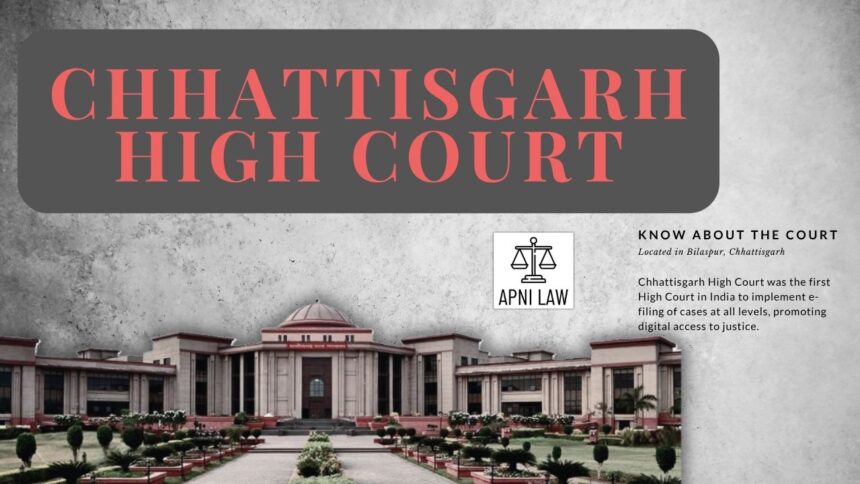Introduction
The Chhattisgarh High Court has ruled that the dependent spouse of a missing government employee, presumed dead after seven years of no contact, can challenge an ex-parte termination and claim service benefits. The bench of Justices Sanjay K. Agrawal and Radhakishan Agrawal observed that a formal court declaration of death is not mandatory when the facts clearly support the presumption of death under the Indian Evidence Act, 1872. The ruling strengthens the rights of dependents and clarifies the legal position on service benefits when an employee has been missing for a prolonged period.
Facts of the Case
The case involved a Senior Technician (Electrical) employed with Bhilai Steel Plant (BSP) under the Steel Authority of India Limited (SAIL). The employee suffered from mental illness and went missing from duty. His wife lodged a First Information Report (FIR) on 14 January 2010, and a public notice of his disappearance was published on 18 February 2010. The local police also informed BSP that the employee was missing. Despite these reports, BSP initiated disciplinary proceedings against the missing employee. A charge sheet was issued on 11 December 2010, but notices sent to his addresses were returned unserved. Subsequently, the company conducted an ex-parte departmental inquiry and removed the employee from service on 17 September 2011. The management also ordered his family to vacate the company quarter.
The employee’s wife challenged the termination before the Central Administrative Tribunal (CAT), Jabalpur Bench, which set aside the removal order. The Tribunal directed SAIL and BSP to provide all consequential service benefits to her. SAIL then approached the Chhattisgarh High Court, arguing that the dependent wife had no locus standi to challenge the termination since there was no formal declaration of death by a competent court.
What the Court Said
The High Court referred to Section 108 of the Indian Evidence Act, 1872, which states that if a person has not been heard of for seven years by those who would naturally have heard from them, the law presumes the person to be dead. The Court also relied on the Supreme Court’s ruling in Ramrati Kuer v. Dwarika Prasad Singh & Ors., which recognized the legal presumption of death after a person remains unheard of for over seven years. The bench clarified that a formal declaration under Section 34 of the Specific Relief Act, 1963, is not essential when facts supporting the presumption of death are clear and undisputed.
In this case, the employee had been missing for more than seven years, and no evidence suggested he was alive. Therefore, the Court held that the wife had the legal standing to challenge the termination since the removal order directly affected her livelihood and right to claim service benefits. The Court also emphasized that the presumption of death under Section 108 applies automatically after seven years of disappearance, and dependents need not obtain a separate declaration of death unless contested.
The bench also referred to an Office Memorandum issued by the Government of India on 28 April 2022, which directs payment of family pension, gratuity, and leave encashment to the families of missing employees after the lapse of a certain period. The Court stated that this memorandum should apply to public sector undertakings like SAIL and Bhilai Steel Plant as well. The High Court upheld the Tribunal’s decision and dismissed the writ petition filed by SAIL, confirming that the dependent wife was entitled to all consequential benefits of her missing husband’s service.
Implications of the Judgment
This judgment has significant implications for both employees and public authorities. It clarifies that dependents of missing employees have the right to challenge wrongful terminations and claim service benefits without waiting for a formal declaration of death. The decision ensures that employers cannot unjustly terminate missing employees without observing fair procedure or considering the legal presumption of death under Section 108 of the Evidence Act. For government departments and public sector undertakings, the ruling serves as a reminder to comply with administrative memoranda concerning missing employees and to extend benefits such as pension, gratuity, and leave encashment to their families.
The Court’s interpretation reinforces the principle that disciplinary actions cannot be sustained against a missing person who cannot defend themselves. It also underscores the need for empathy and procedural fairness when dealing with cases involving disappearance due to illness or other circumstances beyond the employee’s control. The ruling further establishes that dependents have a direct stake in such matters and are legally competent to seek justice.
For any specific query call at +91 – 8569843472
Conclusion
In Steel Authority of India Limited & Anr. v. Vikash Kothe & Ors. (WPS No. 10215/2019), the Chhattisgarh High Court made a landmark ruling affirming that a dependent spouse can challenge an ex-parte termination and claim full service benefits of a missing employee presumed dead after seven years. The Court held that a formal declaration of death is not necessary when the facts clearly support the presumption. This judgment strengthens the legal rights of dependents, ensures fairness in administrative proceedings, and upholds the humane principle that families of missing employees deserve rightful protection and compensation under the law.








